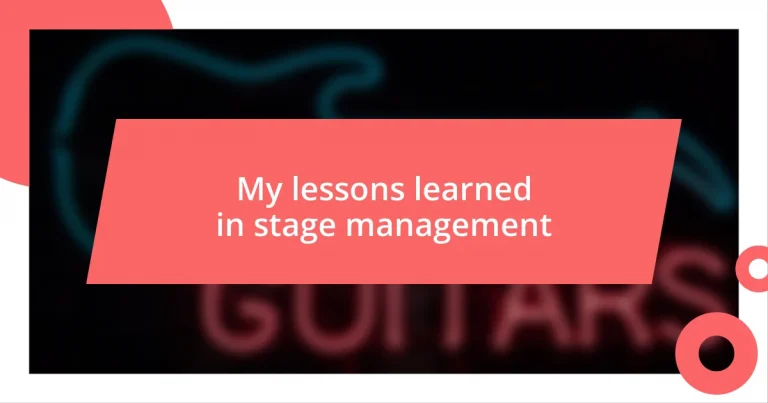Key takeaways:
- Effective communication is crucial in stage management, preventing misunderstandings and fostering a collaborative environment.
- Flexibility and adaptability during unexpected challenges are essential for maintaining team morale and ensuring the show’s success.
- Continuing education and embracing technology enhance stage management skills and improve workflows, leading to better production outcomes.
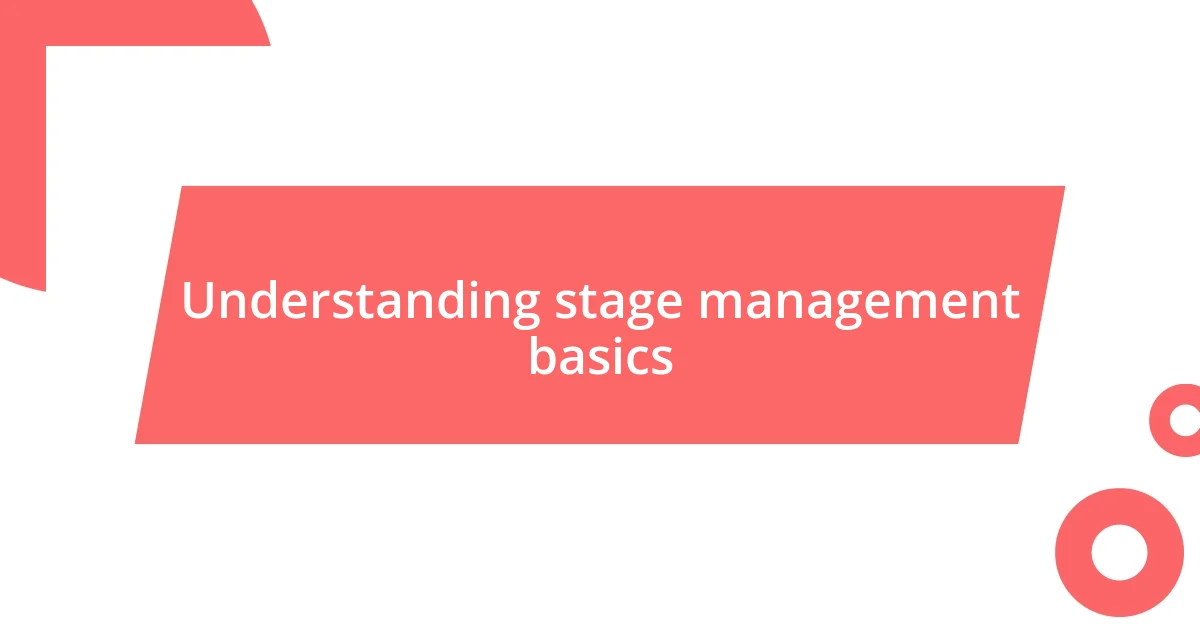
Understanding stage management basics
Stage management is the backbone of any performance, acting as the bridge between the creative vision and the technical execution. I remember my first experience as a stage manager; I felt a mix of excitement and terror as I realized I was the one holding everything together. How often do we underestimate the importance of clear communication? Each cue and note I jotted down became a lifeline for the cast and crew, guiding them through the chaos of live theater.
One fundamental aspect I learned quickly was the art of organization. I found myself creating elaborate spreadsheets for cues and roles, fueled by the fear of something slipping through the cracks. Believe me, nothing is more nerve-wracking than the silence before a scene transition. I still recall the adrenaline rush of coordinating between lighting, sound, and the actors—it’s a high that keeps you coming back for more!
Managing a stage is not just about overseeing logistics; it’s about fostering a collaborative spirit. During one show, the leading actor faced a significant personal challenge, and it was crucial for me to adapt in real-time, to shift the atmosphere and support them emotionally. Isn’t it incredible how a single moment can transform a production? Each challenge only deepened my appreciation for the unity of the team, reinforcing the belief that stage management isn’t just a role—it’s a lifeline for a collective artistic journey.
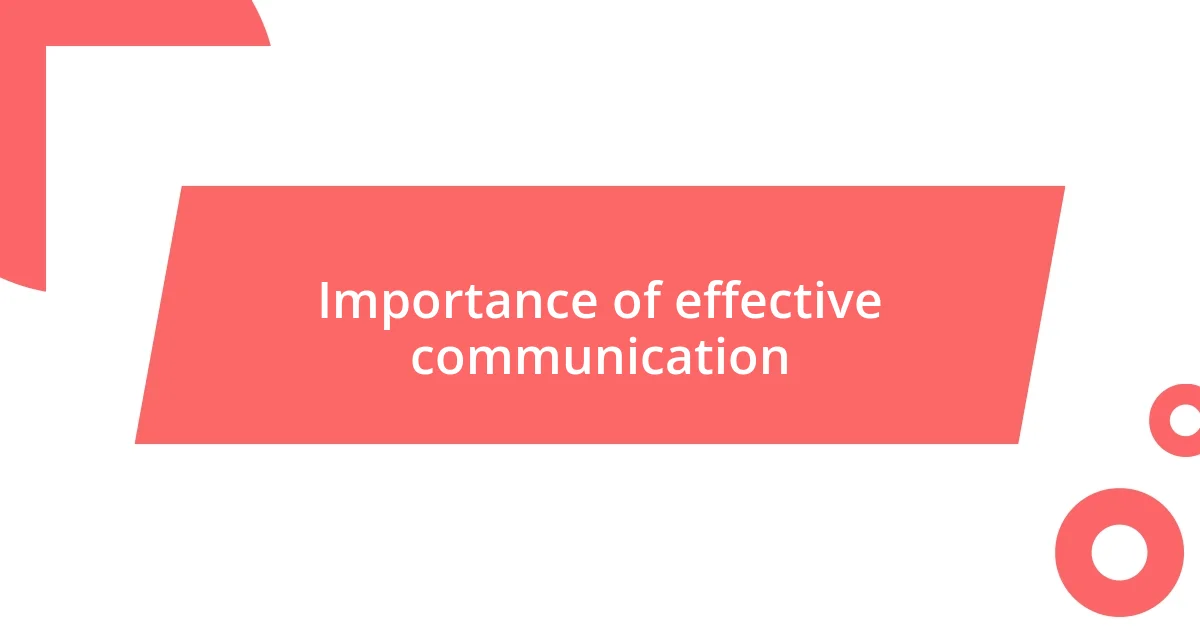
Importance of effective communication
Effective communication is the heart of stage management. There were times during rehearsals when a simple miscommunication about a cue sent everyone scrambling. I still remember a night when I had to quickly address a mix-up with sound effects; the audience was just a few moments away from being thrown off by silence. It became clear to me that being concise and assertive in my communication not only kept things running smoothly, but also eased anxiety among the crew.
Throughout my experiences on different productions, I’ve learned that addressing potential issues before they escalate is vital. In one particular instance, a lighting technician misinterpreted my instructions and set up the wrong colors for a scene. I took a moment to breathe and approach with curiosity rather than frustration, and together we worked out a solution. That day solidified my belief: fostering open lines of communication encourages creativity and problem-solving on the spot.
I’ve often found myself reflecting on the balance between authority and approachability in communication. During a stressful technical rehearsal, I made it a point to check in with everyone, from the actors to the backstage crew. Their collective sigh of relief when I asked if they had any concerns was palpable. It was a reminder that effective communication isn’t just about delivering orders; it’s about listening, empathizing, and creating a safe space for everyone involved.
| Effective Communication | Consequences of Poor Communication |
|---|---|
| Clear directives reduce confusion | Increased tension among the team |
| Encourages collaboration among crew | Misunderstandings lead to mistakes |
| Builds trust and respect | Creates a stressful environment |
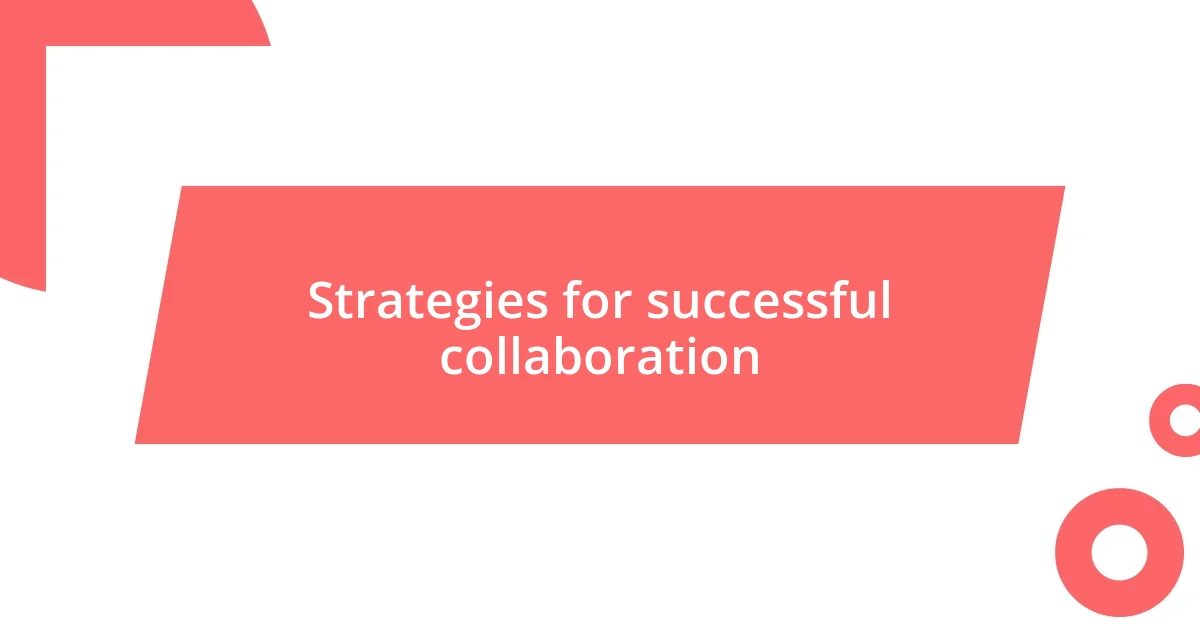
Strategies for successful collaboration
When it comes to successful collaboration, I’ve discovered that creating a supportive atmosphere is essential. I vividly remember a time when our cast faced a particularly challenging rehearsal. I took the initiative to organize a casual brainstorming session, allowing everyone to share ideas openly. The camaraderie that emerged was magical and incredibly empowering, proving that collaboration thrives when team members feel valued and encouraged to contribute.
- Foster open dialogue by encouraging everyone to express their thoughts.
- Organize team-building activities to strengthen relationships.
- Always follow up with team members after discussions to show you value their input.
I’ve also learned the importance of establishing clear roles within the team. Early in my journey, I experienced a moment where overlapping responsibilities led to our lighting technician and sound engineer double-booking cues. It was a deliciously awkward moment, yet it taught me the value of clarity. By defining each person’s role and responsibilities early on, I’ve found that it minimizes confusion and helps everyone work in harmony towards a common goal.
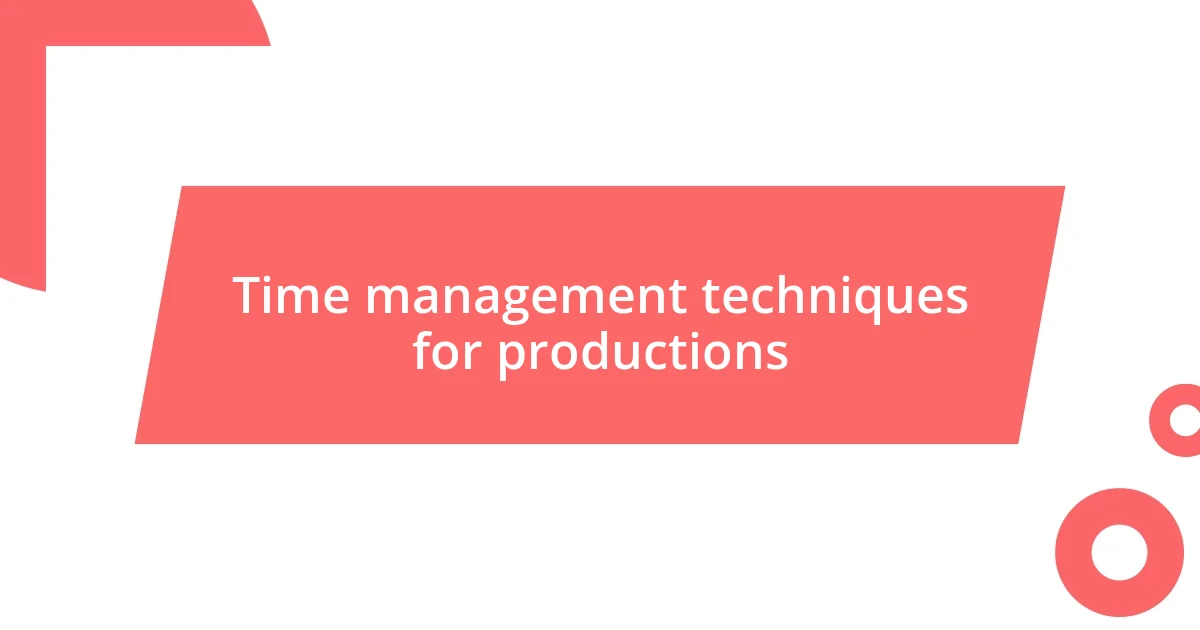
Time management techniques for productions
Managing time effectively during productions can feel like walking a tightrope, but it’s crucial for a successful show. One technique that has consistently worked for me is creating detailed timelines for each rehearsal and performance. I recall a production where we simply laid out our objectives for the week and, to my surprise, everyone benefited from the structure. The acting team could visualize their progress, while the crew could prepare adequately for each transition, leading to an overall reduction in pre-show anxiety.
Another technique I’ve embraced is the use of checklists. There was a particularly frantic dress rehearsal when I realized I hadn’t accounted for the quick changes our actors had to make. By jotting down each change and sharing that list with the team, we avoided chaos during the performance. It’s amazing how a little organization can prevent unnecessary stress; I’ve learned that these lists serve as reminders for all involved and create a sense of accountability.
Finally, I often leverage technology to enhance our time management. During a recent production, we utilized a shared online calendar that built in reminders for key milestones. This not only helped everyone stay on the same page but also fostered a sense of unity. Everyone could see upcoming deadlines, and I often wondered how different my earlier productions might have been if I had embraced such tools from the get-go. In the fast-paced world of stage management, adapting to tech options can truly empower your team and streamline your processes.
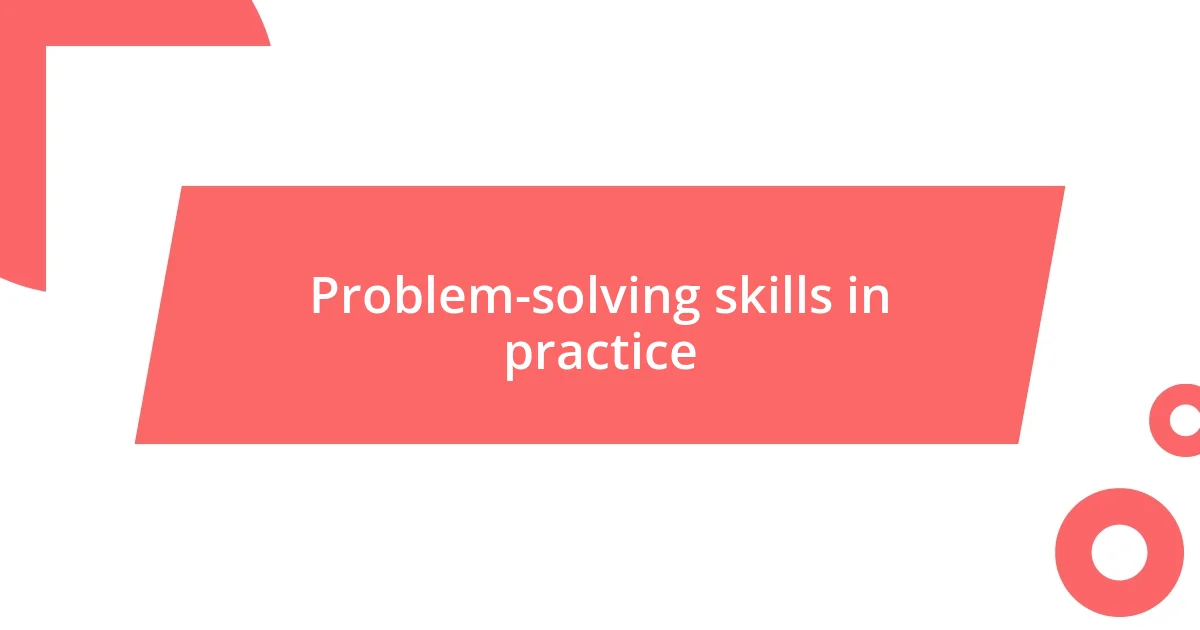
Problem-solving skills in practice
When it comes to problem-solving, I’ve found that adaptability is key. I remember one performance where unforeseen technical issues caused a ripple of panic among the crew. Instead of letting frustration take over, I encouraged a quick team huddle. We brainstormed alternative approaches on the spot, shifting responsibilities and focusing on what we could control. That moment not only saved the show but reinforced my belief in the power of collective creativity in crisis.
Reflecting on that experience, I’ve realized that a calm demeanor can significantly influence the team’s morale during stressful times. Just the other day, a last-minute actor substitution threw our rehearsal schedule into chaos. Rather than allowing stress to bubble over, I maintained a relaxed vibe, reassuring everyone that we would adjust as necessary. I can’t stress enough how these moments teach us resilience and the importance of staying positive, even when challenges seem overwhelming.
Another lesson I cherish involves capturing lessons learned after a hiccup. After a challenging production where we misestimated our set changes, I introduced a debrief session with the team to discuss what went wrong. I noticed that this practice not only fostered accountability but also reinforced that mistakes are not failures; they are stepping stones to improvement. Have you ever thought about how such reflections could transform your approach in future projects? It’s remarkable how embracing our missteps can lead to growth and a stronger, more cohesive team.

Lessons from real stage experiences
During my time in stage management, I’ve learned that flexibility is vital when the unexpected happens. I vividly recall a moment when an actor lost their voice just hours before the curtain rose. With nerves running high, I proposed an impromptu read-through with our understudy. Watching the team rally together to support one another reminded me how crucial it is to have trust and solidarity within the cast and crew. Have you ever faced a situation that seemed dire, only to find that teamwork turned it around?
Another lesson I cherish is the importance of clear communication. There was a time when sound cues weren’t reaching the right moment, leading to awkward silences on stage. After some confusion, I decided to implement a designated cue caller. This small adjustment transformed the flow of the production, and I realized the power of clarity in our roles. Isn’t it fascinating how a little organization can make such a difference? Each member of the team needs to know their part, and communication helps bridge any gaps.
Lastly, I often reflect on the emotional rollercoaster that is live performance. During one particular show, I felt a rush of pride as I watched our hard work pay off. But that night also taught me about emotional vulnerability. I had to address an audience member who had become disruptive. Instead of reacting defensively, I took a deep breath and calmly redirected their attention. It struck me how our emotions can influence the atmosphere of a performance—both on stage and off. How do we nurture that emotional balance to create a more harmonious experience?
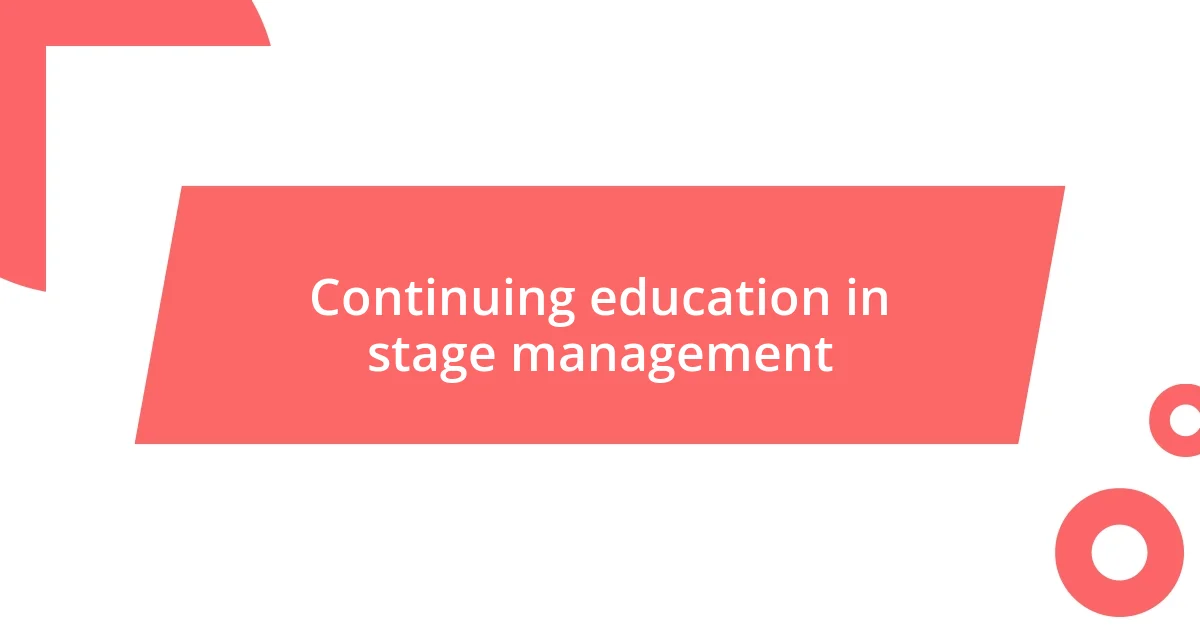
Continuing education in stage management
Continuing education in stage management is essential for personal and professional growth. I remember attending a workshop focused on crisis management, which opened my eyes to new strategies. The instructor shared practical scenarios, allowing us to role-play different crises. Engaging in those exercises not only refined my skills but also reinforced how important it is to stay informed about the latest industry practices.
One experience that particularly stands out was a masterclass on incorporating technology into stage management. I thought I was tech-savvy, but I learned about innovative tools for scheduling and communication I hadn’t considered before. Playing around with these tools at home felt like unearthing treasure. This made me realize that enhancing our technical skills can drastically alter our workflow. How often do you seek out learning opportunities that push you out of your comfort zone?
Moreover, I find that attending industry conferences provides an invaluable chance to connect with fellow stage managers. I recall chatting with a colleague who shared her experience implementing a new rehearsal technique. This casual conversation sparked ideas I hadn’t thought about before. It’s fascinating how learning can happen in informal settings. Engaging with others in our field can inspire us and challenge our viewpoints, creating a richer understanding of our craft.












